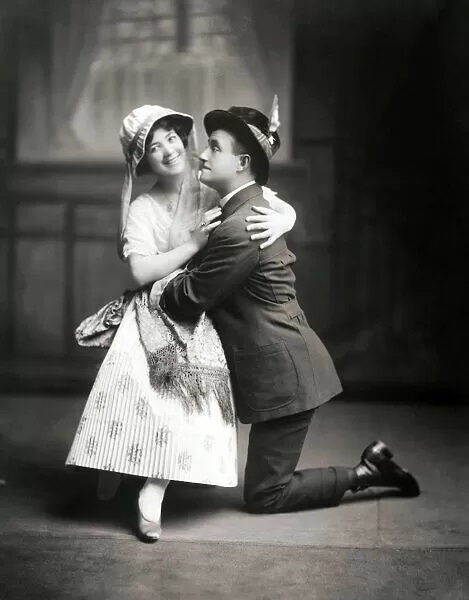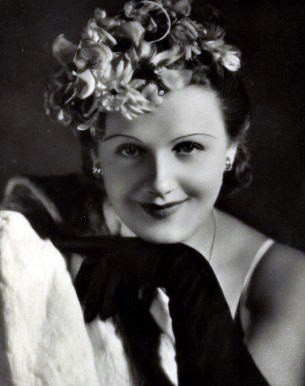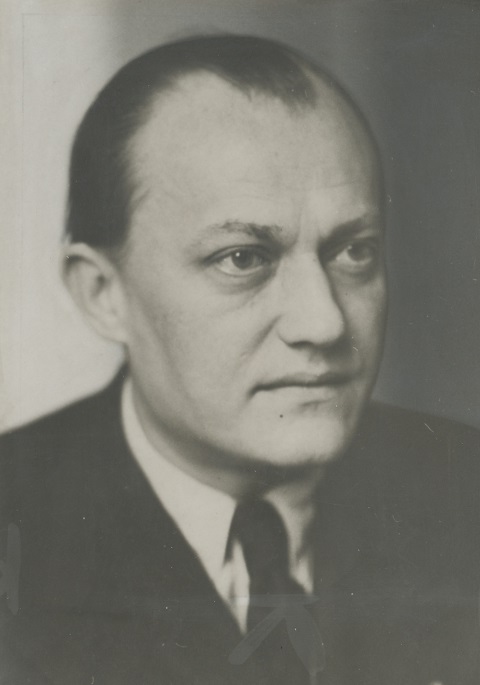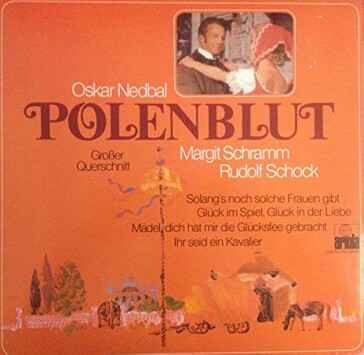Kevin Clarke
Operetta Research Center
25 February, 2023
In March 2023 there’s a three-day conference in Prague devoted to the question of “Czech Operetta and Its Transnational Context”. It’s put together by David Vondráček and offers many well-known international guest speakers.

Emma Trentini and Clifton Crawford in the 1915 Friml operetta “The Peasant Girl”. (Photo: Unknown)
The program includes William Everett discussing Friml’s Broadway operetta The Peasant Girl (1915), which had Emma Trentini in the title role. Mr. Vondráček will discuss Oskar Nebdal’s Polenblut, while Vojtěch Frank presents a talk on “The Girl from the Mining Settlement“ (“Emancipation through Sentimentality in the First Miners’ Operetta”), it focusses on Rudolf Kubín’s 1942 The Girl from the Colony.

Käthe Ehren, Josef König and Therese Löwe in “Polenblut” at Carltheater in Vienna. (Photo: Ludwig Gutmann / Theatermuseum.at)
Other highlights include Andrea Jochmanová’s talk on “Mary Bártů: The Journey of the Diva through Czechoslovak and German Stages”, Steffen Höhne reflects on Franz Kafka’s relationship with operetta, and Viktor Velek talks about “Operette bei den Wiener Tschechinnen und Tschechen”, i.e. how the Czech population of Vienna reacted to the genre historically.

Mary Bártů. (Photo: Le Théâtre de Teplitz / Teplice)
Micaela Baranello (author of the recent book The Operetta Empire) flys in from the USA and presents a paper on “The Coasts of Slovakia: Truth, Fiction, and Amalgamation in Operetta’s Nations”, while Daniel Molnar talks about “A Parallel Reality: The Operetta Repertoire of the Hungarian Minority Theatre Košice/Kassa in the First Czechoslovak Republic”.
Miriam Blümlová addresses the interwar period at the Olomouc Theatre where Albert Roussel’s Le testament de la tante Caroline was given. Vojen Drlík asks about the operetta scene in Brno, while Tristan Willems discusses “Věčné Jaro(mír): Weinberger’s Use of Thematic Materials throughout His Operetta Career”.

Jara Beneš in 1930. (Photo: Max Fenichel)
There’s also a focus on film operetta (in a talk by Šárka Gmiterková), Stefan Schmidl analyses Jara Beneš. Pavel Bár tackles “Prague Operetta Theatres during the Nazi Occupation“, Michal Ščepán asks about “Operetta in the Slovak Republic (1939–1945): Performances and Compositions throughout the Times of the Client State of Nazi Germany”.
As a grand finale, Carolin Stahrenberg and Nils Grosch present a talk with the academically cryptic title “Mobile Networks and Intermedial Interfaces in Musical Theatre: Interweaving of Stage, Song, and Other Media”, followed by Brian S. Locke discussing “Nomads in the Marketplace: Negotiating the Publication History of Czech Operetta, 1918–1948”.
The event closes with a concert on Saturday, 25 March. The concert program will include various Czech operetta rarities performed by soprano Karolína Grebeníčková, tenor Ondřej Benek, accompanied at the piano by Štěpánka Rohlíčková. (For more details click here.)

A highlights recording of “Polenblut” with Margit Schramm and Rudolf Schock. (Photo: Ariola)
The official conference languages are English and German. You can find out more on the website of the Institute of Art History (click here).
Let’s hope all these glorious papers will be published afterwards, to create wider international awareness for the topic.
